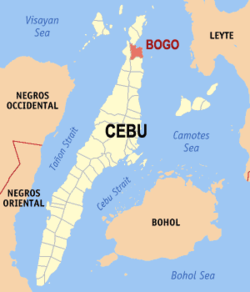Bogo City, Cebu
| Bogo | |
|---|---|
| Component City | |
| City of Bogo | |
 Map of Cebu with Bogo highlighted |
|
| Location within the Philippines | |
| Coordinates: 11°02′N 124°00′E / 11.03°N 124°ECoordinates: 11°02′N 124°00′E / 11.03°N 124°E | |
| Country | Philippines |
| Region | Central Visayas (Region VII) |
| Province | Cebu |
| District | 4th district of Cebu |
| Established Cityhood |
1850 16 June 2007 |
| Barangay |
29 (see § Barangays)
|
| Government | |
| • Type | Sangguniang Panlungsod |
| • Mayor | Carlo Martinez (LP) |
| • Vice mayor | Mayel Martinez |
| • City Council |
Members
|
| • Representative | Benhur Salimbangon |
| Area | |
| • Total | 103.52 km2 (39.97 sq mi) |
| Population (2015 census) | |
| • Total | 78,120 |
| • Density | 750/km2 (2,000/sq mi) |
| • Voter (2016) | 48,290 |
| Demonym(s) | Bogohanon |
| Time zone | PHT (UTC+8) |
| ZIP Code | 6010 |
| IDD : area code | +63 (0)32 |
| Income class | 6th class |
| PSGC | 072211000 |
| Website | www |
Bogo (Filipino: Lungsod ng Bogo; Cebuano: Dakbayan sa Bogo), officially the City of Bogo, and often referred to as Bogo City, established in 2007, is a 6th city income class component city in the province of Cebu, Philippines. According to the 2015 census, it has a population of 78,120. In the 2016 electoral roll, it had 48,290 registered voters.
Bogo is located in the northeastern coast of Cebu province, on the principal island of Cebu. It is 101 kilometres (63 mi) from Cebu City and is accessible by land and sea. Bogo has an area of 103.5 square kilometres (40.0 sq mi), which constitutes 2.3% of the area of Cebu island and 2.1% of the total land area of Cebu province. The city marches with: Medellin to the north, San Remigio to the west, and Tabogon to the south; on the east it is bound by Camotes Sea.
The year 1600 saw the founding of a real settlement which was subsequently transformed into a barangay with small huts made of cogon grass and bamboo, standing where the Bogo Central Extension now stands. While the barangay was then part of another community in the north (today's town of Daanbantayan), the natives enjoyed tacit freedom of self-rule although they continued to pay tributes and taxes to the chieftain of Daanbantayan. This barangay grew in prominence and for this reason, it was separated from Daanbantayan. In January 1850 the Bishop of Cebu, appointed Spanish friar Fr Jaime Micalot as the first parish priest of Bogo and decreed Saint Vincent Ferrer as the town's patron saint.
The first mass was celebrated in the hastily built chapel on 5 April 1850, to coincide with the death anniversary of the patron saint. This chapel was later gutted by fire and a new stone church was constructed at the place where the Bogo Town Plaza is now located. About this time, the Spanish authorities in Bogo introduced civil government. Pedro Aballe became the first Cabeza de Barangay or mayor from 1864 to 1869. Senator Pedro L. Rodriguez, popularly known as the "Grand Old Man of Bogo" named one of the oldest streets of the town after him.
...
Wikipedia

